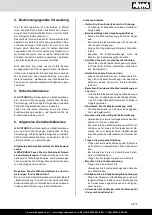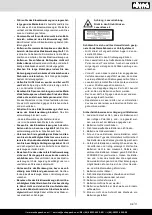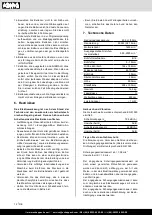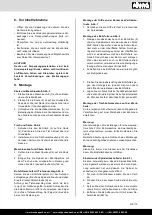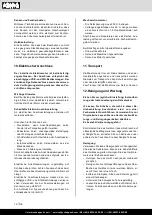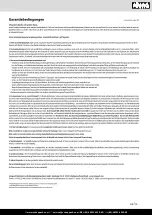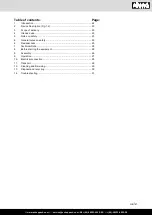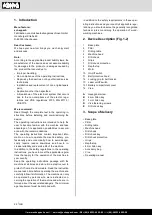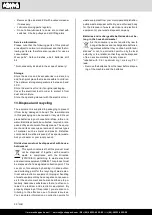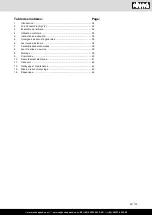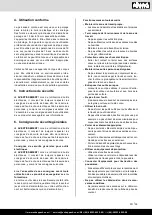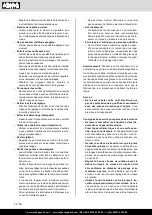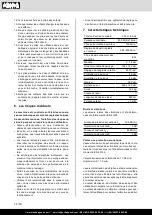
www.scheppach.com /
+(49)-08223-4002-99 /
+(49)-08223-4002-58
GB | 23
- Ensure the work area is adequately lit.
- Do not use power tools where there is a fire or
explosion hazard.
•
Protect yourself against electric shock
- Avoid body contact with earthed parts (e.g.
pipes, radiators, electric cookers, refrigerators).
•
Keep other people away
- Do not allow other people, especially children, to
touch the power tool or cable. Keep them away
from your work area.
•
Store unused power tools safely.
- Unused power tools should be stored in a dry,
high or locked place, out of the reach of children.
•
Do not overload your power tool.
- Your work better and more safely within the
specified power range.
•
Use the correct power tool
- Do not use low-performance machines for heavy
work.
- Do not use the power tool for purposes for which
it is not intended. For example, do not use use
a circular hand saw for cutting tree branches or
logs.
•
Wear suitable clothing
- Do not wear loose clothing or jewellery that
might become caught in moving parts.
- When working outdoors, non-slip footwear is
recommended.
- Wear a hair net to contain long hair.
•
Use protective equipment
- Wear safety goggles.
- Use a dust mask for work which generates dust.
•
Connect a dust extraction device
- If connections are available for dust extraction
and collection devices, make sure that these
are connected and properly used.
•
Do not use the cable for purposes for which it
is not intended
- Do not use the cable to pull the plug from the
socket.
- Protect the cable from heat, oil and sharp edg-
es.
•
Secure the workpiece
- Use jigs or a vice to hold the workpiece securely.
This is safer than using your hand.
•
Avoid abnormal body postures.
- Ensure secure footing and keep your balance at
all times.
•
Maintain tools with care
- Keep cutting tools sharp and clean for better and
safer working.
- Follow the instructions for lubrication and chang-
ing tools.
- Regularly check the connection cable of the
power tool and, if it is damaged, have it replaced
by a qualified specialist.
- Check extension cords periodically and replace
them if they are damaged.
4. Intended use
The bench drill is designed for drilling in metal, wood,
plastic and tiles. Straight shank drills with a drilling
diameter from 1.5 mm to 16 mm can be used.
The device is intended to be used by do-it your-
selfers. It was not designed for heavy commercial
use. The tool is not to be used by persons under the
age of 16. Children over the age of 16 may use the
tool except under supervision. The manufacturer is
not liable for damage caused by an improper use or
incorrect operation of this device. The bench-type
circular saw is designed for the slitting and cross-
cutting of all types of timber, commensurate with the
machine’s size. The machine is not to be used for
cutting any type of roundwood.
Please note that our equipment has not been de-
signed for use in commercial, trade or industrial appli-
cations. Our warranty will be voided if the equipment
is used in commercial, trade or industrial businesses
or for equivalent purposes.
5. Notes on safety
m
Caution!
When using power tools, observe the
following basic safety measures for the prevention of
electric shocks and the risk of injury and fire.
Please read all these instructions before using this
electric tool and please keep the safety instructions.
6. General notes on safety
m
Caution!
When using power tools, observe the
following basic safety measures for the prevention of
electric shocks and the risk of injury and fire: There
is a risk of injury.
General Safety Instructions for Power Tools
m
WARNING! Read all safety instructions and
guidelines carefully.
Failure to follow the safety
instructions and guidelines may result in electric
shock, fire and/or serious injuries.
Save all safety instructions and guidelines for
the future.
The term „power tool“ used in the safety instructions
refers to mains-operated electric tools (with a mains
cable) and to battery-operated electric tools (without
a mains cable).
Safe working
•
Keep your work area tidy
- An untidy workplace can lead to accidents.
•
Consider environment influences
- Do not expose power tools to rain.
- Do not use power tools in damp or wet surround-
ings.

